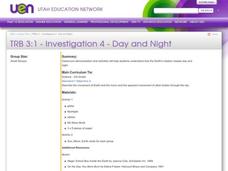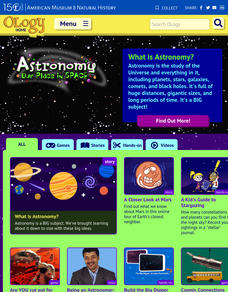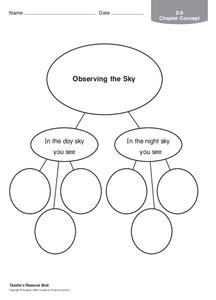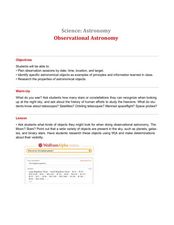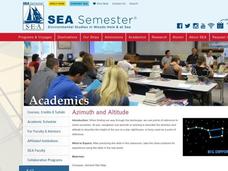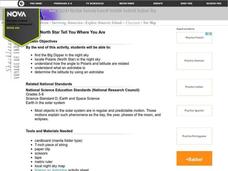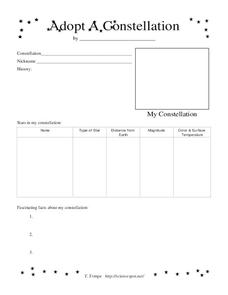Curated OER
Day and Night
Third graders view a classroom simulation that demonstrates how the Earth's rotation creates day and night.
Curated OER
Planets, Constellations, and Stars
In this space science worksheet, students find the answers to the research questions that focus on the stars, planets, and constellations.
Toll Middle School
Create Your Own Constellation Mini-Project
When looking up at the night sky, there are many familiar constellations that most people can identify. However, someone had to point those out and create the related mythology. Put your pupils in the place of the creators and invite...
Intel
Starquest
Almost every ancient culture observed the stars and saw pictures in the patterns. Studying stars allowed them to guide travelers, determine when to plant crops, when to harvest food, and the stories surrounding the images include some of...
American Museum of Natural History
Planetary Mysteries
A website all about planetary mysteries—it's a one-stop-shop for all things, stars, planets, and space travel. Scholars read an astronomy overview to discover the page's big ideas, then choose from the plethora of resources, including...
Curated OER
Observing the Sky
In this sky worksheet, students will write down 3 things they see in the sky during the day and 3 things they see in the sky at night. This worksheet is a graphic organizer.
Curated OER
Constellations
In this constellations worksheet, students read about the different constellations and how to locate them in the night sky. Then students complete 4 multiple choice and 7 short answer questions.
Curated OER
Planets Curriculum
Students complete an in-depth study of the known planets in the solar system. As a class, students identify the planets that are known in the universe, in the night sky. They explain the differences between planets and stars and the...
Curated OER
Observational Astronomy
Students research about the characteristics of celestial bodies using a database. In this space science activity, students collect data such as brightness, apparent color and size by observing the night sky. They share their findings...
Curated OER
Tanabata: The Japanese "Wish Upon a Star"Festival
Learners research the legend of Tanabata in order to explain some of the astronomical findings in the night sky. The Japanese tell the story in order to explain the origin of celestial bodies.
Curated OER
Star Quest
Students engage in a lesson of using maps in order to find constellations in the night sky. They also conduct research using three constellations. The research is used to create a project to inform others. The teacher also leads the...
Curated OER
Using a Starfinder
In this starfinder worksheet, 5th graders construct a starfinder in order to determine which stars are in the night sky on a given date and time. Students use their starfinder to answer 9 questions about the stars and constellations,...
Curated OER
Azimuth and Altitude
Learners use a compass and their hands to find positions of stars and planets in the night sky or of the sun during the day.
Curated OER
Observing the Sky
Middle schoolers explore astronomy. In this astronomy instructional activity, students discuss the history of the movement of celestial bodies and then communicate with other middle schoolers regarding the movements that they observe in...
Curated OER
The Sun, Moon, and Our Solar System: Teacher/Student Notes
Introduce basic Earth and space science to your budding astronauts. This handout works in two ways, the first part provides information about the sun, moon, eclipses, and Earth to be read to or by the class. The second part is composed...
Curated OER
Let the North Star Tell You Where You Are
Students participate in activities in which they find the Big Dipper and locate the North Star in the night sky, examine the relationship between the angle to Polaris and latitude, and determine latitude by using an astrolabe.
Curated OER
Sky 2: Shadows
Students explore space science by participating in a shadow experiment. In this sky observation lesson, students identify how the sun creates different sized shadows by moving across the horizon. Students utilize yard sticks, markers,...
Curated OER
Gazing At Cosmic Pinballs
Students explore the world of stars. They see that the color of a star tells how hot or cold it is, that stars come in different sizes. and that stars are moving through space. They draw lines connecting start to star.
Curated OER
Map the Constellations
Students build constellation guides from empty sotf drink cans. Using star charts, they use straight pins to mark the major stars in the constellations. After turning the charts over, they connect the dots. When they look through cans...
Curated OER
Sky Watchers: Ancient Astronomers
Students close their eyes and picture the sky. They are asked to brainstorm things they may see in the course of a night and day, such as the movement of the sun, moon, and stars. Students work in groups to coduct their research. They...
Curated OER
Adopt A Constellation
In this space science worksheet, students discover and write the name of their favorite constellation. Then they describe the history of it and draw a diagram, labeling the major stars and providing lines to show its shape.
Curated OER
Adopt a Constellation
Students adopt a constellation and find detailed information about their constellation. In this constellation lesson plan, students use the web to find information about a constellation of their choice. They identify the history of the...
Curated OER
Astrology: Fact Or Fiction?
Students investigate the concept of astrology and how it evolved from history. They use the Zodiac in order to find the location of constellations in the night sky. The differences between astrology and astronomy are compared and any...
American Museum of Natural History
What is Astronomy?
Go study the universe. Pupils learn seven aspects about astronomy and astronomers. They begin to learn about constellations; distance and motion between objects; gravity; the electromagnetic spectrum; dark matter and energy; and teams of...


